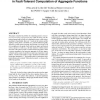Free Online Productivity Tools
i2Speak
i2Symbol
i2OCR
iTex2Img
iWeb2Print
iWeb2Shot
i2Type
iPdf2Split
iPdf2Merge
i2Bopomofo
i2Arabic
i2Style
i2Image
i2PDF
iLatex2Rtf
Sci2ools
DC
2016
2016
Near-optimal communication-time tradeoff in fault-tolerant computation of aggregate functions
This paper considers the problem of computing general commutative and associative aggregate functions (such as SUM) over distributed inputs held by nodes in a distributed system, while tolerating failures. Specifically, there are N nodes in the system, and the topology among them is modeled as a general undirected graph. Whenever a node sends a message, the message is received by all of its neighbors in the graph. Each node has an input, and the goal is for a special root node (e.g., the base station in wireless sensor networks or the gateway node in wireless ad hoc networks) to learn a certain commutative and associate aggregate of all these inputs. All nodes in the system except the root node may experience crash failures, with the total number of edges incidental to failed nodes being upper bounded by f. The timing model is synchronous where protocols proceed in rounds. Within such a context, we focus on the following question: Under any given constraint on time complexity, what i...
| Added | 01 Apr 2016 |
| Updated | 01 Apr 2016 |
| Type | Journal |
| Year | 2016 |
| Where | DC |
| Authors | Yuda Zhao, Haifeng Yu, Binbin Chen |
Comments (0)

